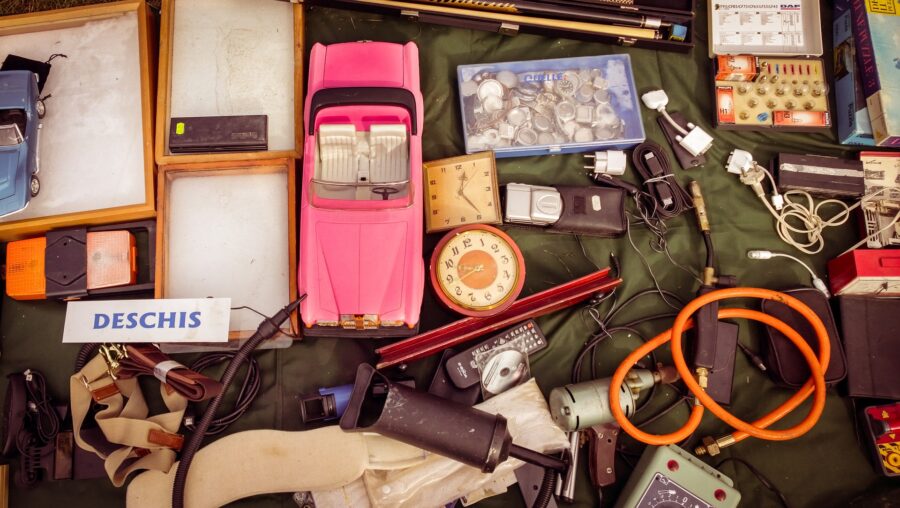Collecting Clutter
I have moved a lot in my life. I do not recall some of my initial moving around when I was young. I was born in Iowa and we moved to Virginia shortly thereafter. Within a few years, when I was around four years old, we moved to California. I lived in the Bay Area and moved around more times than I can count or remember (mostly in Santa Clara and Campbell) until I was about thirteen. We then moved to Washington. We lived with family for a short period of time until moving into our own place. When I was in high school, I moved to northern California to live with my dad (in between Sacramento and Lake Tahoe, up there in them mountains!). After graduating high school, I moved to southern California (“The OC”—that’s right, bro). We were in Anaheim Hills at first and then we moved to Aliso Viejo. From there I moved to Santa Ana and got married. My wife and I lived in a little studio for a couple of years. We were offered a house to rent in Fullerton from a gracious friend, so we packed up and moved to Fullerton where we lived for about five years. We recently moved from Fullerton back into a small studio in Anaheim where we live currently. However, we intend to move again next month—this time out of the country to Manchester, UK where I hope to begin working on a PhD in Religions and Theology (Biblical Studies) at the University of Manchester.
Aside from all of my own moving around, I have helped family and friends move as well. Sometimes, I have assisted my dad or others just go through their storage units to rearrange things or to get rid of stuff. One thing I have learned from all of this moving and cleaning is that clutter is annoying. Every time I have moved and gone through my own belongings I have become frustrated with myself for collecting clutter which I either had to move again or just throw away. I do not get too upset over things which were useful or used often. I get upset over things which I ‘had to have’ at the time I acquired them and then which sat idle or were stored away, taking up space, only to be given attention again when moving or cleaning. Sure enough, the item was either thrown away or stored away yet again. Some clutter can easily be disregarded. Almost all of us have either been moving or cleaning and have death-gripped an item in our hands, staring at it, and struggling over whether or not to let it go. I have witnessed this phenomenon occur with friends and family when helping them move. I literally watch them discover some stored away piece of junk and stare at it with a look of bafflement overtaking their countenance. They make a few comments or ask a rhetorical question regarding the nonsensicality of having hoarded the item, then they either throw it into the trash pile or [much to my bewilderment] put it right back into the ‘keep’ pile!
To be fair, some items are retained as ‘keepsakes’ or due to sentimental value. I think retaining ‘keepsakes’ or items with major sentimental value is important. I would never advocate whimsically or happily getting rid of such things. However, I do think that being selective is beneficial. There are some items which I could easily throw away or decide to attribute more sentimental value to and store away. I try to only keep really important things and disconnect with the rest. Our situation might be different from a lot of other people who perhaps have a home which they intend to stay in for the rest of their lives. Other people we know have children and want to keep things around to pass on to them. This is all understandable. I suppose the question becomes: How much should be kept or what should be kept?
Why do we like to keep clutter? I believe a significant reason is that clutter can comfort. I think that people buy things or collect things often because ‘things’ and ‘stuff’ are actually quite comforting. Even in the instance of ‘keepsakes’ or sentimental items, these can bring comfort simply by being in our possession or by the memories they induce. Being surrounded by possessions can make a person feel safe and ‘at home’. Sometimes people collect a tremendous and awful amount of clutter which can be psychologically and even physically unhealthy. I think of the reality TV show Hoarders which revealed the lives and homes of people who hoarded excessively or perhaps had a ‘hoarding disorder’. Some people hoard due to compulsive spending; these people love to spend money or buy things. These purchases accumulate and, voila, they have become hoarders.
People can develop an unhealthy sense of comfort or reliance from hoarding. Our value and identity as human beings are not ultimately defined by our possessions. True, the loss of all of a person’s possessions might result in a tremendous setback, especially if such possessions were required for business or income. I am not thinking so much about business or income-dependent items. I am thinking more about possessions which bring a sense of comfort, security, or which a person stores away thinking they will find use for them some day. I am talking about the annoying clutter we have to address when moving or cleaning. I try to imagine anything left which I might have that would constitute my description here of ‘clutter’ and I envisage such items being suddenly lost—how devastated would I be? I personally would not be too fazed by it, but I am sure some people would be troubled.
Being overly concerned with material things can also distract us from spiritual things. Luke’s gospel is unique in its concerns for women, gentiles, and the disadvantaged (including the sick and poor). Luke’s gospel is also filled with dichotomies. There are often contrasts with this life versus the life to come, the rich versus the poor, wisdom versus foolishness, humility versus pride, and materialism versus spiritualism. One such Lukan account of Jesus’ teaching on materialism and greed is pertinent for our topic:
“Someone in the crowd said to Him, ‘Teacher, tell my brother to divide the family inheritance with me.’ But He said to him, ‘Man, who appointed Me a judge or arbitrator over you?’ Then He said to them, ‘Beware, and be on your guard against every form of greed; for not even when one has an abundance does his life consist of his possessions.’ And He told them a parable, saying, ‘The land of a rich man was very productive. And he began reasoning to himself, saying, ‘What shall I do, since I have no place to store my crops?’ Then he said, ‘This is what I will do: I will tear down my barns and build larger ones, and there I will store all my grain and my goods. And I will say to my soul, ‘Soul, you have many goods laid up for many years to come; take your ease, eat, drink and be merry.’ But God said to him, ‘You fool! This very night your soul is required of you; and now who will own what you have prepared?’ So is the man who stores up treasure for himself, and is not rich toward God.” (Luke 12:13–21, NASB)
The challenge here is a real one: what good will saving clutter be if one suddenly or unexpectedly passes on and leaves it all for another person to deal with? The second issue is one of distraction. Investing too much of our resources, time, energy, and minds in materialism can distract from investing in spiritual things (cf. Luke 12:34; Matt 6:19–21). This warning is equally important for the Christian or spiritual person as it is for the unbeliever or non-spiritual person. I am thinking of people who believe in some form of an afterlife and those who do not. Keep in mind that Jesus was speaking mainly to Theists—that is, to Jews who believed in God. Some Jews, however, did not believe in much of an afterlife, if any (i.e., the Sadducees). The Gospels were written to Jews (who came to believe in Jesus as the Messiah), to Gentiles (who were perhaps still ‘spiritual’ in a Greco-Roman sense of religious belief), and perhaps to non-spirituals (atheists who denied the existence of any gods). The earliest churches were made up of people from all of these types of backgrounds. While Greco-Roman beliefs did not really focus on an afterlife, people were still aware that they would eventually die and leave behind their possessions for others to either inherit or ransack. Therefore, the point stands that there is much more to life (this life or the next) than lugging around or keeping around clutter. It is true that monetary wealth and wealth of possessions are gifts from God and these should be enjoyed without finding too much comfort or reliance on the things themselves (Ecclesiastes 5). The hoarding of clutter is still not prescribed.
Let My Clutter Go!
I have vented about this issue of collecting clutter to my wife many times. She agrees with me for the most part. Every time we have moved or helped someone move she also vows to never accumulate junk. My wife works in the Arts & Crafts industry, so we naturally have a lot of materials around our place for that reason. These, however, are necessities for what she loves and for her work. She actually does not really have too many things as it is and most people probably wouldn’t even notice it all or see it as clutter. Aside from her crafting materials and my books (for school), we do not have very many ‘things’. I often tell people [somewhat jokingly] that we are ‘minimalists’ when they comment about our scarcity of belongings. The entire time we lived in Fullerton where we rented a house, people would visit for the first time and ask if we had either just moved in or were moving out. We just didn’t have a lot of things. We had minimal decorations and furniture. My wife’s craft projects typically served as decorations (these have always been more special since she handcrafted them herself). Still, when we moved, we had no problems about donating or throwing things away. My wife reminds me that when we eventually settle down and own a place she is going to fill it with knickknacks and cute things. She does this in jest to poke fun at me. I actually won’t mind this too much so long as we are settled down and there are not overly creepy gnomes surrounding me. I too find some comfort in looking at decorations in homes, especially when the décor is themed. For some time, I had some German beer steins around our place, just here and there. I also used them from time to time to drink a good German bier and feel really authentic!
I have noticed that getting rid of clutter is tremendously therapeutic. It feels good to just let things go. I love the idea of being able to move and fit nearly all of my belongings into a single suitcase. I believe that limiting our possessions and throwing away junk in our lives (literally) can be a form of therapy for people. It can help eliminate senses of false comfort and redirect feelings of security to more sure sources. Personally, I like being defined by who I am and what I have accomplished rather than by what I own. I would rather be defined by my relationships with others than by my possessions. I don’t expect or advise everyone to throw everything away or even to become a ‘minimalist’ like I at times imagine myself to be. That is not my intention. I obviously do not advocate some form of neo-Platonism in which material things are evil or to be avoided. I also do not promote undecorated houses (as I hope I have made clear already). Instead, I am annoyed by piles of legitimate ‘junk’ hoarded away in closets, garages, storage units or even right in the middle of the house. When moving or cleaning I have often asked aloud, “How does a person accumulate so much junk?!” I have heard others ask this as well. I have debated with family members over whether or not to keep silly things during moving. “When do you actually think you are going to use that again?” I often ask. I only hope for people to consider the actual intrinsic values of material possessions and to inquire of what level of priority such things have in their lives. I also want to share about the therapeutic benefit of letting unnecessary clutter go, thus emotionally detaching ourselves from mere objects and reassessing our sources of comfort. Comfort is better found in our relationships with people than in being surrounded by or retaining objects. So, it seems every time I move or clean I have to convince myself, exclaiming aloud in the voice of Charlton Heston’s Moses character from The Ten Commandments, “Let my clutter go!”





2 Comments
Leave your reply.